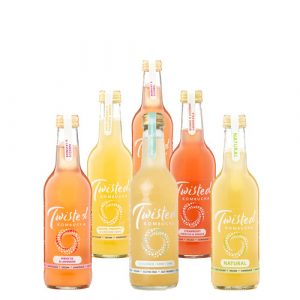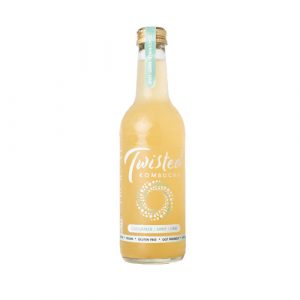
Welcome to Twisted Kombucha, where we believe in harnessing the power of nature to support our health and well-being. As a food scientist and nutritionist, I am excited to share the potential of fermented foods and drinks, particularly vegan kombucha, in providing relief and nourishment during the menopausal journey. In this blog, we will explore the science behind menopause, and its symptoms, and delve into the wonderful world of fermented goodness to discover how they can help alleviate menopausal discomforts. While I am the founder of Twisted Kombucha, the information shared here is purely educational, designed to empower you with knowledge and support your well-being.
What Is Menopause?
Menopause marks a natural transition in a woman’s life, signifying the end of reproductive years. It occurs when the ovaries cease to release eggs, resulting in a decline in hormone production, specifically estrogen and progesterone. This hormonal shift leads to a range of physiological and psychological changes.
Understanding Menopause and Why It Happens
Menopause is a natural biological process that typically occurs between the ages of 45 and 55, with the average age being around 51. It is triggered by a decline in the number of ovarian follicles and the subsequent decrease in hormone production. Estrogen, in particular, plays a vital role in various bodily functions, including regulating the menstrual cycle and maintaining bone density.
The Onset of Menopause
Perimenopause is the transitional phase leading up to menopause and can begin several years before the final menstrual period. During perimenopause, hormone levels fluctuate, leading to irregular periods and various menopausal symptoms. The transition to menopause is considered complete after 12 consecutive months without a menstrual period.
Symptoms of Menopause
Menopause brings forth a range of symptoms that can vary in intensity and duration among women. Common symptoms include hot flashes, night sweats, mood swings, sleep disturbances, vaginal dryness, decreased libido, weight gain, and changes in skin elasticity. These symptoms can significantly impact a woman’s quality of life.
To get into more detail, the symptoms of menopause are:
Hot Flashes: Sudden, intense sensations of heat that often cause flushing, sweating, and a rapid heartbeat. Hot flashes can be accompanied by a feeling of anxiety or a chill after the heat subsides.
Night Sweats: Episodes of excessive sweating during sleep that can disrupt sleep patterns and lead to fatigue and daytime sleepiness.
Mood Swings: Women may experience frequent and intense changes in mood, ranging from irritability, anxiety, and feelings of sadness or depression.
Sleep Disturbances: Menopause can disrupt sleep, leading to insomnia or difficulty falling asleep or staying asleep throughout the night. This can result in fatigue and daytime drowsiness.
Vaginal Dryness: A decrease in estrogen levels can cause vaginal tissues to become dry, thin, and less elastic. This can lead to discomfort during sexual intercourse and an increased risk of vaginal infections.
Decreased Libido: Many women experience a decrease in sexual desire or libido during menopause due to hormonal changes and vaginal dryness.
Weight Gain: Hormonal changes during menopause can contribute to weight gain, particularly around the abdomen. Slowing metabolism and lifestyle factors may also play a role.
Changes in Skin Elasticity: Decreased estrogen levels can affect collagen production, leading to changes in skin elasticity and the appearance of fine lines and wrinkles.
Joint and Muscle Pain: Some women may experience joint and muscle pain during menopause, which can be attributed to hormonal changes and inflammation.
Cognitive Changes: Menopause can be accompanied by cognitive changes, including difficulty concentrating, memory lapses, and foggy thinking. These symptoms are often referred to as “menopausal brain fog.”
It’s important to note that not all women will experience the same combination or severity of symptoms, and the duration of symptoms can vary. Seeking support and guidance from healthcare professionals can help in managing menopausal symptoms and improving overall well-being.
Coping With Menopause Symptoms
Navigating the challenges of menopause can be a transformative journey, but there are strategies and lifestyle choices that can help alleviate the symptoms and enhance overall well-being. One such strategy involves incorporating fermented foods and drinks into your diet. These nourishing options can provide relief and support during this life stage, thanks to their unique properties and benefits.
Do Fermented Foods & Drinks Like Kombucha Really Help?
In short, yes, they do! Fermented foods and drinks have gained recognition for their potential in promoting overall health and well-being. During menopause, incorporating fermented options into your diet can provide specific benefits that alleviate symptoms and support hormonal balance. While they may not eliminate menopausal symptoms entirely, they can be a valuable addition to a holistic approach.
The Benefits of Fermented Goodness for Menopause
Let’s explore how fermented foods and drinks can be a valuable tool in coping with menopause symptoms:
Hormonal Balance: Fermented foods and drinks, such as vegan kombucha, contain beneficial bacteria that support gut health. These bacteria play a crucial role in metabolizing estrogen and maintaining a healthy balance of hormones in the body. By promoting a thriving gut microbiome, fermented options can help optimize hormone balance and reduce the intensity of menopausal symptoms.
Gut Health and Nutrient Absorption: Menopause can impact nutrient absorption and digestion. Fermented foods and drinks are rich in enzymes and probiotics that aid in digestion and enhance nutrient absorption. The probiotics present in fermented options help create an optimal environment for nutrient breakdown and absorption, ensuring that the body receives the essential vitamins and minerals it needs during this transformative stage.
Bone Health: Estrogen plays a vital role in maintaining bone density, and its decline during menopause increases the risk of osteoporosis. Fermented foods, like tempeh and miso, are excellent sources of plant-based calcium and vitamin K2. These nutrients are essential for bone health and can help support bone density, reducing the risk of fractures and promoting overall skeletal well-being.
Mood Regulation: Menopause can bring about mood swings and irritability due to hormonal fluctuations. Fermented foods and drinks contain B-vitamins and beneficial bacteria that support the production and regulation of neurotransmitters like serotonin. These neurotransmitters are crucial for mood stability and mental well-being. By consuming fermented options, individuals may experience improved mood regulation, reduced irritability, and a greater sense of emotional balance during menopause.
Gut-Brain Connection: The gut and brain are closely interconnected, and a healthy gut microbiome has been linked to better mental health. Fermented options, with their probiotics and gut-nourishing properties, contribute to a robust gut-brain axis. The probiotics in fermented foods and drinks support the production of neurotransmitters and play a role in modulating brain function, enhancing mental clarity, and promoting emotional well-being during menopause.
Anti-inflammatory Properties: Inflammation is associated with menopausal symptoms, including joint pain and hot flashes. Fermented foods and drinks, like kimchi and sauerkraut, contain bioactive compounds with anti-inflammatory properties. These compounds help reduce inflammation in the body, potentially alleviating joint pain and reducing the intensity and frequency of hot flashes experienced during menopause.
By incorporating fermented foods and drinks into your diet, you can harness the benefits of these nourishing options to support your overall well-being and cope with the symptoms of menopause.
Remember to choose high-quality fermented options, such as vegan kombucha from Twisted Kombucha, to ensure you are receiving the full range of benefits these products have to offer.
Conclusion
As you navigate the transformative journey of menopause, incorporating fermented foods and drinks into your diet, including vegan kombucha, can provide a range of benefits. From supporting hormonal balance and gut health to promoting bone health, mood regulation, and reducing inflammation, fermented options offer natural relief and nourishment.
Embrace the power of fermented goodness as you embrace this new chapter with grace and well-being. Remember to choose high-quality options, like Twisted Kombucha, to experience the full potential of these transformative beverages!












